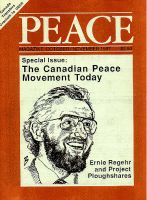
Peace Magazine Oct-Nov 1987, page 10. Some rights reserved.
Search for other articles by Robert Norman here
During the early stages of nuclear development in 1959, Canada became the world's largest exporter of uranium, and has remained one of the three largest since then. Canada is responsible for the transfer of uranium to the Soviet Union worth between $80 and $325 million (Canadian) since the late 1970s. This country's uranium promotion to its supposed adversaries, such as the Soviet Union, conflicts with its membership in NATO. There are economic and military reasons for the Soviet Union to process Canadian uranium, even if all the Canadian uranium is sent on to other countries: A few hundred million dollars worth of uranium is crucial to the economy of scale and the viability of a Soviet uranium refinery, which enables Soviet military weapons to be produced.
Both those favoring Canada's membership in NATO, which has nuclear weapons, and those who oppose all nuclear armaments, can agree on the absurdity of selling uranium to an adversary. Already, Canada's involvement in the production of nuclear weapons in developing countries (for example, India) contradicts our government's policy, officially held since 1%5, of supporting the peaceful use of uranium and nuclear technology. Uranium sales to the Soviet Union further discredit Canada's innocence. In response to the transfer of uranium to Latvia in 1982, Conservative leader Joe Clark exclaimed: "Canada is involved in a system of processing uranium that could allow more countries to produce nuclear bombs and weapons."
How are Canada's uranium exports distributed among market countries? CANDUs within Canada demand only 15 percent of Canada's uranium output. The remaining 85 per cent is either used directly in reactors in Argentina, Japan, Korea, Romania, Sweden and by Euratom, or is processed: According to a document sent by Marc Lalonde to the executive director of Greenpeace on May 14, 1980, Canadian uranium is processed by the U.S., West Germany, the U.K, France and the USSR. Gordon Edwards, Montréal author and contributor to Regehr and Rosenblum's Canada and the Nuclear Arms Race outlines the extent of Canada's contributions of uranium for military purposes: "A sieeable portion (between five and forty percent, depending on the year) goes to the USSR for enrichment. These enrichment facilities are primarily military facilities with civilian spinoffs, but the military and civilian aspects are in no way separated except by bookkeeping." Edwards not only claims that Canadian-based uranium could enter the Soviet's arsenal, he asserts that an integral connection exists between enrichment plants and military uses for Canadian uranium. A fundamental argument against the sale of uranium to Latvia is that Canada sustains the processing plants in Latvia by supplying raw resources of uranium, thereby strengthening the military infrastructure of the Soviet Union. The Nonproliferation Treaty (NPT) forbids the sale of uranium and technology to non-nuclear states and states not party to the treaty. Indeed, it is illogical for Canada to sell uranium to an adversary such as Latvia, which is a part of the Soviet Union. Moreover, it is a definite challenge to the NPT that Canada is selling this uranium to Latvia, which is a non-nuclear weapons state. Although Canada contravenes the NPT by selling uranium to France, which is not party to the NPT, these sales are, at least in part' redeemed because there is no friction between France and Canada. The question of the Latvian sales should be dealt with by the Canadian government and the other NPT members.
Unfortunately, the NPT cannot prevent the transfer of uranium to hostile governments already having nuclear bombs. (Strangely enough, the NPT would allow Canada to export nuclear bombs and supplies to the Soviet Union, but not to Latvia) However, clearly it is within the power and interest of Canada's government to prohibit the transfer of uranium to the Soviet Union. Since Canada should be responsible for confirming, with the help of the International Atomic Energy Agency (IAEA), that the end use of uranium, if exported to non-nuclear weapons states, will not proliferate nuclear weapons, the sales to Latvia are a concern.

Peace Magazine Oct-Nov 1987, page 10. Some rights reserved.
Search for other articles by Robert Norman here